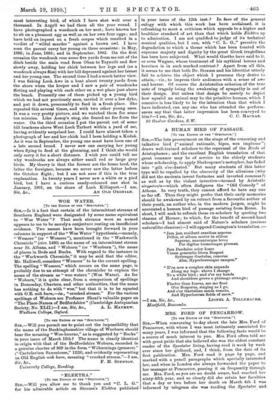A HUMAN BIRD OF PASSAGE. [To THE EDITOR OF THE
" SPECTATOR."]
Sin,—The late presentment on the stage of the reasoning and talkative bird (" animal rationale, bipes, non implume ") draws well-trained scholars to the reperusal of the Birds of Aristophanes ; and the excellent English translation of that great romance may be of service to the elderly students whose scholarship, to apply Shakespeare's metaphor, has faded into " gilt o'er-dusted." But many students of this latter type will be repelled by the obscurity of the allusions (why
did not the ancients invent footnotes and inverted commas ?) as well as by the violent invective—termed by Aristotle abrxpoioyfa—which often disfigures the "Old Comedy" of Athens. In very truth, they cannot afford to hate any one so far off. Thus they might prefer that their early memories
should be awakened by an extract from a favourite author of their youth, an author who, in the modern jargon, might be accounted a human bird of passage oviating from Rome. In short, I will seek to refresh these ex-scholars by quoting two stanzas of Horace ; to which, for the benefit of second-hand scholars—I had almost said of Nature's scholars (animae naturaliter classicae)—I will append Conington's translation :-
"Jam jam residunt ernribus asperse Penes, et album mutor in alitem Superne, nascunturque leves
Per digitos humerosque plumae.
Jam Daedaleo odor Icaro Visam gementis litora Bospori Syrtesque Gaetu]as, canorus Ales, Hyperboreosque eampos."
" E'en now a rougher skin expands Along my legs : above I change To a white bird ; and o'er my hands And shoulders grows a plumage strange : Fleeter than Icarus, see me float O'er Bosporus, singing as I go, And o'er Gaetnlian sands remote, And Hyperborean fields of snow."
ifoatfield, Boscombe.










































 Previous page
Previous page